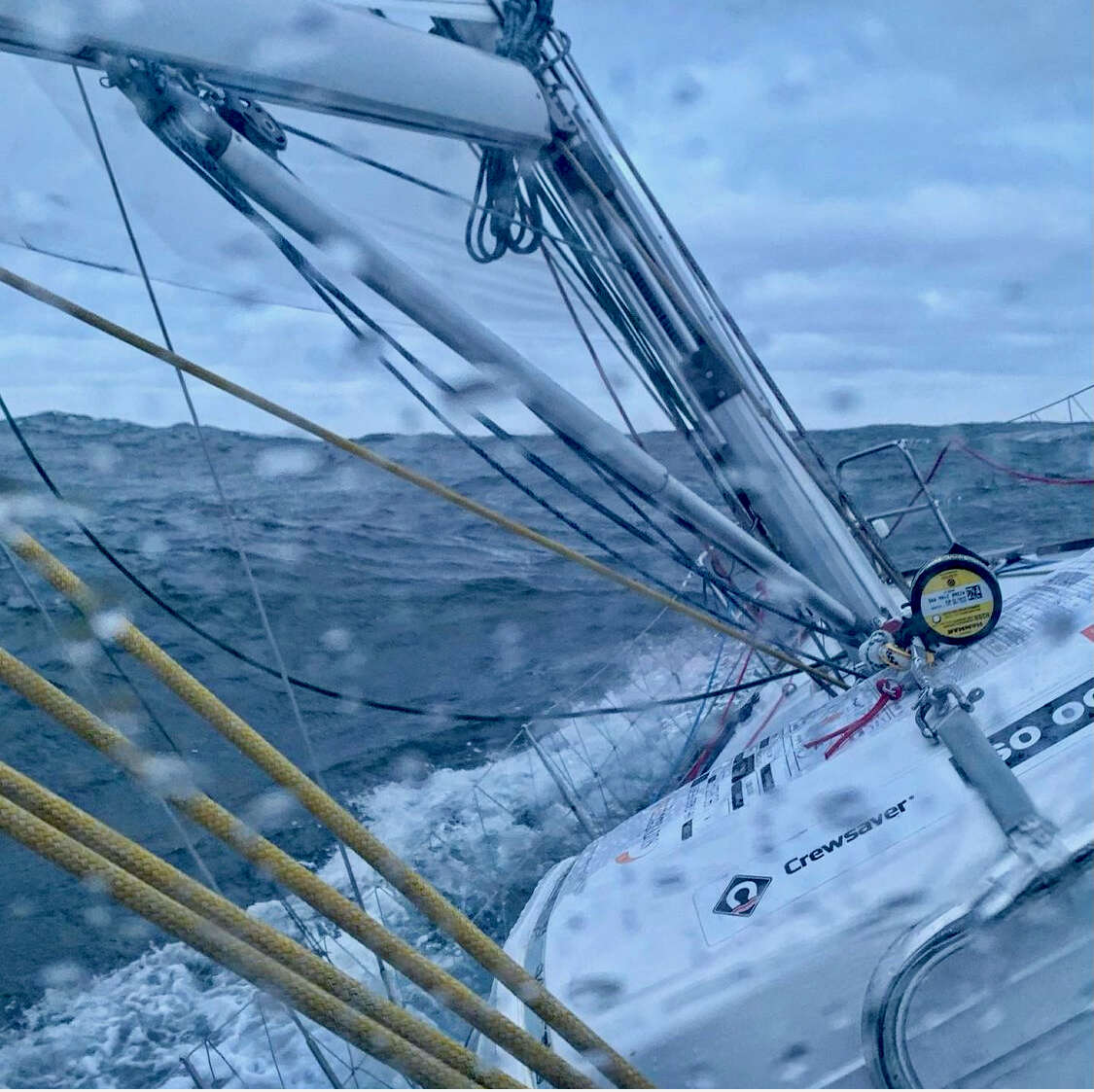
It's sometime near midnight, and the wind is building. But I'm already falling asleep. An hour or two prior, we do a head sail change to the heavy weather jib as the wind begins hitting 30kn, and the furled, restrained genoa is out of range. The boat is straining, jumping over the seas, and simply unhappy. Moving about is difficult, and the helm is heavy.
The watch captain makes the call, and we drag the saltwater soggy, heavy, large genoa down below decks as the heavy weather jib is hoisted. It takes 20 minutes in the pitching wet seas as the sun sets, but it's better to do it now before the light fades away completely. It's an onerous endeavor to drop the large sail and fold it to the best of our abilities. But a required task to get the more purpose-built heavy weather jib aloft, which will prove to be a wise call. It's exhausting but necessary.
As the seas build, I'm alerted to water down below. "Adam, there's water on the floorboards!" I go below deck and see that yes, there is water sloshing about in the aft cabin, but the main bilge is fine, almost dry. Water from somewhere else onboard. On a production boat with grid construction of various compartments, water sneaks into the most random of places and makes itself appear as the boat angles change. A skipper knows his ship, and I give the all-clear as I sponge away the salty water, almost certainly from a previous "exciting" sail. But it's hard work, sponging away the water in the pitching seas. It's the closest I've ever become to being seasick, but if a skipper won't sponge away water, who will?
As the night progresses, the wind and seas continue to build. Our competitors begin to retire from the race, with seasick crews, and suspect gear failures. But, it's also time to retire for bed - and a skipper must trust his crew. If we are to sail across oceans, I need to be able to sleep. So, I reluctantly succumb to tiredness, and take my rest in my bunk as we dip into the night with a watch schedule of watch captains who take responsibility for the boat and its crew. And, surprisingly, I fell deeply asleep.
At the break of dawn, I awake. I slept through the night. Nobody woke me, and I found myself confused as to where I was and what time it was. All I know is that there is daylight, and the boat is moving wildly through large seas. I put on my heavy-weather clothing, a ritual that is becoming all too familiar, but no less frustrating as the layers of proprietary gortex-like material and neoprene find their place over my body. After pulling my PFD over my head, and securing its straps the ritual is complete and I make my way on deck.
Bill is on the helm, driving as the boat pitches upwards and downwards through the waves, almost gracefully. He's been here before. The seas are large, and the wind is heavy. On the high side of the boat, the off-watch is perched purposefully if not cautiously trepidicious.
"It's a beautiful morning!" I proclaim as I emerge through the companionway, grabbing every handhold along my path. As I stand, gimballed by my knees and hips, Jaimie asks "How big do you think the seas are?" There is a subtle tension in the air as if to say "Is this OK?"
But it is OK - this is what we came here for. To get offshore, to test ourselves and the boat. The forecast called for heavy weather, and we went anyway. It's perfectly within our capabilities, we just don't know it yet. And so we sail - we continue to reduce sail area, execute our watch schedule, and sail onwards. It's a race after all. Everyone has given up, except for us and one other tenaciously daring crew.
The best outcomes are based on trust. Trust in each other, and trust in oneself. Sailing solidifies teamwork in the most direct of ways. As a skipper, you do your best to assemble a team capable of accomplishing the mission and try to provide the best tools for the job.
You can train, you can mentor, but at the end of the day - you've got to trust your team.